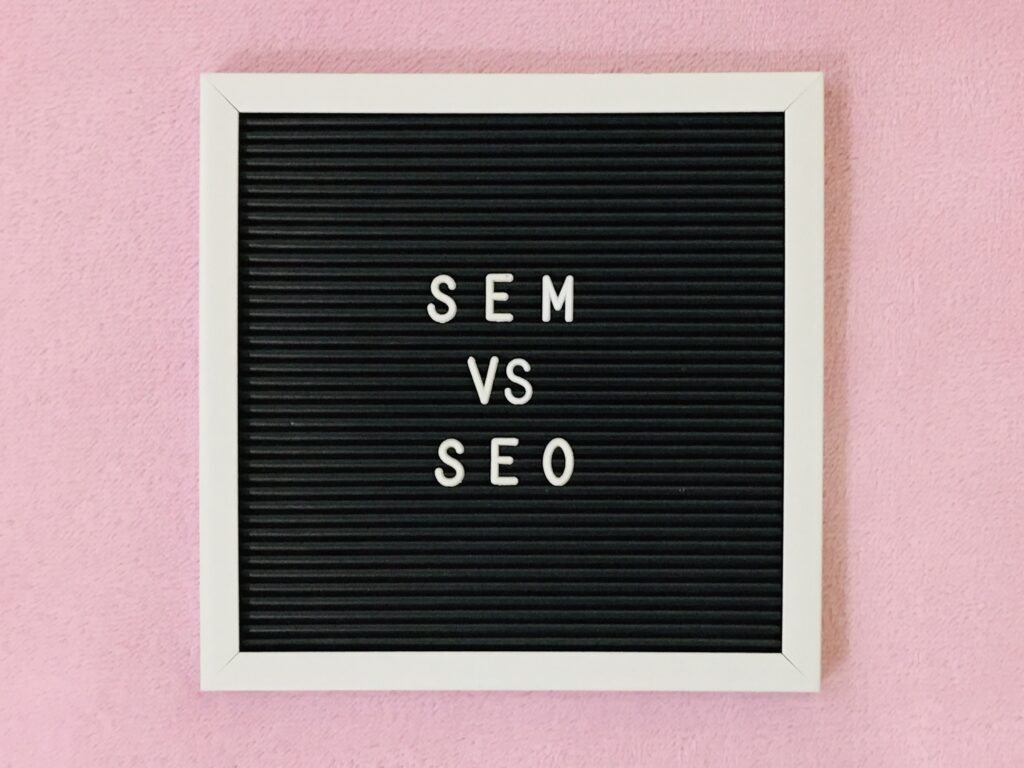How Do Search Engine Optimization (SEO) and Search Engine Marketing (SEM) differ?

If you've been searching (pun intended) for ways to increase your online visibility, chances are you've come across the terms SEO (Search Engine Optimization) and SEM (Search Engine Marketing). They might seem like jargon thrown around by tech-savvy marketers, but understanding these terms is crucial for the growth of your business. So let's dive in and unravel the mystery together.
What is SEO?
Search Engine Optimization (SEO) is the process of improving a website's visibility in organic (non-paid) search engine results. It involves a variety of strategies, tactics, and best practices, all with the goal of improving your website’s position in search engines. This is why SEO is often referred to as "organic" or "natural" lead generation.
Let's take a closer look at some key SEO tactics:
- Keyword Research and Optimization: This involves identifying the right keywords that your target audience uses when looking for products or services like yours, then working these keywords into your website’s content and meta tags in a natural and readable way.
- Quality Content Creation: Search engines reward sites that publish quality, relevant content. Regularly updating your website with such content can significantly boost your SEO.
- Link Building: This is the process of acquiring hyperlinks from other websites to your own. A hyperlink (usually just called a link) is a way for users to navigate between pages on the internet. When other reputable sites link to your website, search engines view this as a vote of confidence, improving your site's rank on search engine results pages (SERPs).
A great example of SEO in action is Maze, a SaaS platform that significantly increased its visibility by focusing on well-crafted content, superior UI/UX designs, scalable link building, and conversion rate optimization techniques. They managed to go from 0 to 35,000 monthly non-branded traffic and rank #1 for highly competitive keywords like "UX Design Tools".
What is SEM?
Search Engine Marketing (SEM), on the other hand, refers to marketing activities involving search engines, where businesses pay to advertise their products or services. The most common form of SEM is pay-per-click (PPC) advertising, where businesses bid on keywords, and pay each time a user clicks on their advertisement.
Key SEM strategies include:
- Keyword Research: Much like SEO, SEM also requires identifying the right keywords that your target audience uses.
- Ad Creation: Crafting engaging and persuasive ads is crucial to SEM. The goal is to attract and convince users to click on your ad and perform a desirable action.
- Landing Page Optimization: Once a user clicks on your ad, they're directed to a landing page. Optimizing this page to align with the ad and the user's expectations is crucial in achieving a high conversion rate.
A great example of effective SEM is Deliveroo, a food delivery company that utilized a detailed account structure for its ads, with separate campaigns for each restaurant within a 2-mile radius. This level of detail and localization led to the creation of over 17,000 campaigns in six languages and multiple cities in 12 countries, supporting Deliveroo's rapid growth.
How SEO and SEM Work Together
Although SEO and SEM serve different purposes, they're not as different as you might think. They're both aimed at increasing visibility on search engines and driving traffic to your website. And when used together, they can create a robust online presence for your business.
Imagine SEO as the steady, reliable tortoise and SEM as the speedy hare from Aesop's fable. SEO builds a strong foundation, ensuring your website is optimized, relevant, and authoritative. This can take time but is essential for long-term success.
SEM, being the hare, provides a quick boost to visibility. It's especially useful when you're launching a new product, running a limited-time promotion, or venturing into new markets.
Together, SEO and SEM can generate synergy, supporting and enhancing the effectiveness of each other. For example, the keyword insights gained from SEM can inform your SEO strategy, helping you understand what your audience is searching for. Similarly, a well-optimized website can improve your Quality Score in Google Ads, potentially reducing your cost per click.
Why Are SEO and SEM Important to Small Business Owners?
Understanding and leveraging SEO and SEM is crucial for small businesses. Here's why:
- Increase Visibility: SEO and SEM can help your business get found by the right people at the right time.
- Drive Traffic: They direct more visitors to your website, increasing the chances of conversions and sales.
- Stay Competitive: In today's digital age, not leveraging SEO and SEM puts you at a disadvantage compared to competitors who do.
Final Thoughts
SEO and SEM are powerful tools in your digital marketing toolkit. While they differ in approach and timeline, both are essential for improving your online visibility and driving business growth. By understanding and implementing the right strategies, you're well on your way to increasing the visibility of your website. Remember, SEO and SEM are most effective when they work together. Start leveraging these strategies today to drive more traffic to your site and grow your business.
Ready to propel your business forward with SEO and SEM? Schedule a discovery call with Your WP Guy and let us help you increase your visibility and reach your business goals.
How Do Search Engine Optimization (SEO) and Search Engine Marketing (SEM) differ? Summary
- SEO (Search Engine Optimization) is the process of improving a website's visibility in organic (non-paid) search engine results. Key SEO tactics include keyword research and optimization, quality content creation, and link building.
- SEM (Search Engine Marketing) refers to marketing activities involving search engines, where businesses pay to advertise their products or services. The most common form of SEM is pay-per-click (PPC) advertising. Key SEM strategies include keyword research, ad creation, and landing page optimization.
- SEO and SEM work together to increase visibility on search engines and drive traffic to your website. SEO builds a strong, long-term foundation, while SEM provides a quick boost to visibility, useful for launching new products, running promotions, or venturing into new markets.
- Understanding and leveraging SEO and SEM is crucial for small businesses to increase visibility, drive traffic, and stay competitive in today's digital age.


